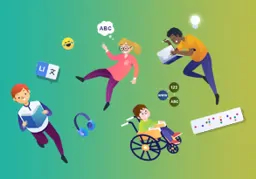AREA OF LEARNING AND EXPERIENCEHealth and Well-being
Guidance to help schools and settings develop their own curriculum, enabling learners to develop towards the four purposes.
2. Statements of what matters
Mandatory
Developing physical health and well-being has lifelong benefits.
This Area can help learners to understand the factors that affect physical health and well-being. This includes health-promoting behaviours such as physical activity, including but not limited to sport; balanced diet; personal care and hygiene; sleep; and protection from infection. It also includes an understanding of health-harming behaviours.
From this understanding, learners can develop positive, informed behaviours that encourage them both to care for and respect themselves and others. These behaviours support learners’ sense of self-worth, their overall mood and energy levels.
Learners will be encouraged to develop the confidence, motivation, physical competence, knowledge and understanding that can help them lead healthy and active lifestyles which promote good physical health and well-being.
How we process and respond to our experiences affects our mental health and emotional well-being.
This Area can help learners explore the connections between their experiences, mental health and emotional well-being. By being provided with opportunities to explore the complexities of these connections, learners can be enabled to recognise that feelings and emotions are neither fixed nor consistent.
Having an awareness of our own feelings and emotions is the foundation upon which empathy can be developed. This can enable us to act in a way which supports the mental health and emotional well-being of others. Supporting learners to develop strategies which help them to regulate their emotions can contribute towards good mental health and emotional well-being, enabling learners to recognise when and where to seek help and support; to develop awareness of mental health issues and are able to advocate on behalf of others.
By learning how to communicate their feelings, learners will be better placed to create a culture where talking about mental health and emotional well-being is normalised.
Our decision-making impacts on the quality of our lives and the lives of others.
This Area can help learners to understand how decisions and actions impact on themselves, on others and on wider society, both now and in the future. It can also help learners understand the factors that influence decision-making, thus placing them in a better position to make more informed and considered decisions.
Learning and experience in this Area can enable learners to develop the critical-thinking skills necessary to consider their decision-making in terms of possible implications, including risks, for themselves and others. This can offer learners opportunities to engage in collective decision-making and to understand the importance of their contributions to this process.
A key decision that affects learners for life is around their career pathways.
How we engage with social influences shapes who we are and affects our health and well-being.
This Area can help learners understand the important role of social influences on their lives. These influences are comprised of rules, social norms, attitudes and values that are created and reinforced by different social groups. It is through interaction with social groups that we experience these influences. They affect our identity, values, behaviours and health and well-being, and often do so without our being aware of it.
Learners will need to engage critically with these social influences within their own culture, as well as those of others, in order to understand how norms and values develop. This can enable them to understand how their own behaviours, relationships and experiences are shaped.
Healthy relationships are fundamental to our well-being.
This Area can help learners understand and value how feelings of belonging and connection that come from healthy relationships have a powerful effect on health well-being.
Learners need to recognise when relationships are unhealthy and need to be aware of how to keep safe, and seek support for themselves and others.
Learners will be encouraged to understand that, throughout their lives, they will experience a range of relationships. They will also be encouraged to develop their abilities to form, nurture and maintain relationships.
As a result, they will see how healthy relationships are vital for a healthy body and mind, allowing us to thrive.







